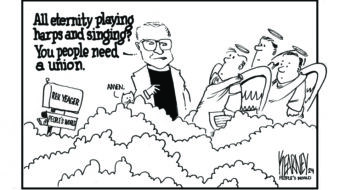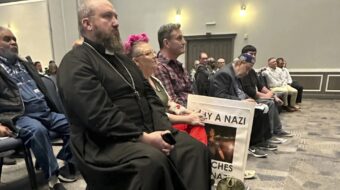CLEVELAND — “Freedom fighter,” “Poor man’s lawyer,” and “One of the most beautiful people I ever met” — these were the words of speakers as several hundred gathered to mourn the passing and celebrate the life of progressive attorney Roy Kaufman at the Good Shepherd Baptist Church here in Cleveland Aug. 19.
Kaufman was also an auto worker, a union official, a peace activist and a grassroots fighter against racism, corruption and police misconduct.
He died Aug. 12 at the age of 80 after several years of fighting Alzheimers.
Kaufman was active in the fight for justice for families of two young men, one Black and the other Puerto Rican, shot and killed by a notorious Cleveland police officer, who because of public outcry, was eventually forced off the street. He then led a ballot effort establishing the city’s Police Civilian Review Board.
He also founded, and for many years led, the Cleveland Chapter of the American-Soviet Friendship Council, which organized numerous delegations of trade unionists, youth and clergy to visit the USSR, and hosted cultural and other delegations from the Soviet Union.
He was a founder and served as vice president of the Grassroots Political Action Committee that relentlessly exposed a shocking case where police authorized sale of drugs in the Black community allegedly to raise money for a sting operation. The group also backed progressive candidates and fought machine politics.
“There were no toes too big for Roy to step on if they got out of line,” said Bert Jennings, another founder of the group.
Kaufman was a proud member of the Communist Party, who served in the U.S. Army at the end of World War II, only to be discharged for his political beliefs. It took acts of Congress and a long fight by his second wife, Joan El-Bey, to restore his service as honorable and win his full benefits.
But struggle was in Kaufman’s roots and was his life blood. As his sister, Gladdie recalled, the family’s ancestors took part in the Underground Railroad and fought the Ku Klux Klan in the Carolinas.
With two other brothers and another sister, Kaufman grew up on a farm in Massillon, Ohio. They all played music and, as a family band, performed at many events. Their mother, Edna, led the Stark County Progressive Party and their father, William, led the county’s farmers’ cooperative.
After leaving the army, Kaufman went to work at General Motors Fisher Body plant in the Cleveland suburb of Euclid. He soon became a shop steward and vice president of the United Auto Workers local. While working there he went to college and law school and fixed up four houses his daughter, Heidi, recalled.
“He always met a challenge,” she said. “He walked the walk. He did not give up. My mother said it was hard to live with a saint”
When the plant closed Kaufman started a law practice with another progressive attorney, Eugene Bayer. He continued to take cases from his union brothers and sisters who had lost their jobs. When they had no money, Kaufman often worked pro bono. One worker gave him an accordion.
The law office trained other working-class and progressive attorneys and was frequently used for meetings of labor and other activists.
George Edwards, a national leader of the Steelworkers Organization of Active Retirees (SOAR) recalled how Kaufman fought for civil rights in his union and, in an amicus brief, argued an historic seniority rights case for Black steelworkers before the Supreme Court.
“If he were alive today,” Edwards said, “he would be fighting for equality for Muslims and immigrants. He would be fighting for jobs and be fully involved in the political challenge we face in the elections.”
Elder Rawle Garvey recalled how Kaufman dressed in cowboy boots and wore a bolo tie. “He had a cowboy hat, but no mask. He was always open and inviting.
“He never professed to be a Christian, but he lived a life of service,” he said. “Roy was a real life hero, a true champion of the underdog.”
“Roy Kaufman fought for people with little power,” said East Cleveland Mayor Gary Norton. “He fought for people who were born a different color, workers in the steel mills and many others. We give thanks for his life. He made some people mad, but he made life better for many more.”
Photo: Roy Kaufman












Comments